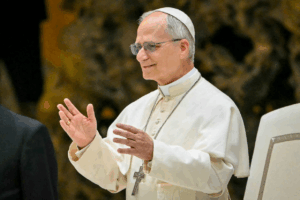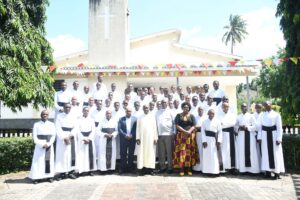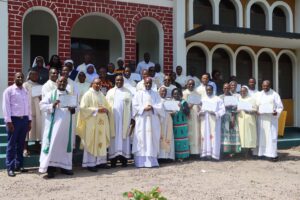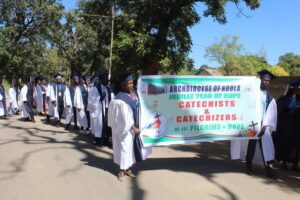KENYA: On Youth and Religion, What Roles Can Family And Christian Community Play?
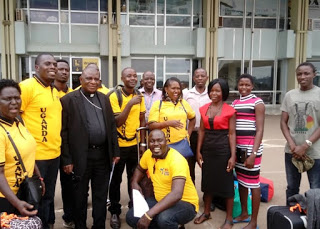
Ugandan Youth with their Bishop attending World Youth Day 2019 in Panama (Image Courtesy)
Janet Wambui (not real names) is a twenty-three-year-old university student. Although Janet comes from a good practicing Catholic family, her knowledge and idea of God is quite basic.
Apart from going for Sunday Mass, she still relies heavily on the catechesis she received while preparing for the Sacraments of Eucharist and Confirmation. She confesses that when she joined the university, she realized that she had a lot of catch-ups to do and she is glad that the Catholic chaplaincy at the university has been helpful.
James Njoroge, 26, on the other hand, has had a better chance of deepening his knowledge and love of God.
“From a very early age, our parents taught us what they believed and why they believed. They (our parents) taught us all kinds of prayers, about the Sacraments and what it meant to be of service to the Church and to the others. They gave us ample opportunity to practice what we learned from their teaching and examples.”
And he went on, “My parents prayed for us; they lived the faith fully. All of us are involved in Church more than just going to the church and this has helped us a lot.”
Through his parents who were great models of faith, James and his siblings grew close to the Church both in words and in deeds. They are not simply Sunday church goers but active members. Each of their family members is active in one Church association or the other. Thus, James confessed that his family and friends who are devout Catholics have given him a model and accountability system.
From the above examples, it is clear that today more than ever, religion ought to offer young people something more than the basic Christian formation. If that were the case, the question that immediately comes to mind is, ‘Are our churches and other places of worship and institutions that exist to support and manage the practice of religious beliefs playing their role?
It’s not uncommon that many of our parish or out-churches lack activities and programmes to engage Christians, let alone the youth outside of mass or prayer service. Yet, experience has shown that there is beauty and strength to be found within the the faith community. Parishes and Christian communities that engage their Christians in various association activities are more vibrant than where the Christians are simply Sunday church goers. Not surprisingly, vibrant church communities tend to grow and develop faster.
One clear example of a vibrant Christian community is Our Lady of Mount Carmel and St. Charles Lwanga Parish, Nkoroi in Ngong Catholic Diocese, Kenya. The parish has a strong and vibrant Christian Community with different associations ranging from Catholic Men’s Association and Young Christian Workers to Pontifical Missionary Society. There is even a strong and active youth group.
The Parish which is run by the Order of Carmelites was founded 10 years ago and today it has three Sunday services that are fully packed, with the second mass being animated by the youth choir. If there is any celebration in the parish requiring catering services, it is often handled by the youth group and the funds are used to run youth activities.
Most importantly, the parish offers the youth various services like retreats and other formation programmes. They youth participate in exchange visits to other youth groups both within and outside the country, all of which have kept them active is church activities.
And what about the parents – do they have the time and the opportunity to instil the love of God in their children? With today’s hustle and bustle, one wonders if parents are able to create time to sit down and share their life stories with their children. Whereas it’s praiseworthy for parents to financially sustain their families, it is equally important for them to create quality time to be with their children.
It is during such moments that parents can teach their children about the love of God and His place in their lives. Moreover, parents’ day-to-day encounters with their children will help to further strengthen the children’s idea of the love of God and one’s neighbour, putting it into practice.
Not many people have this opportunity to be together and pray as a family, let alone go to church together. And what is more, some parents under the guise of freedom of worship decide not to baptise their children, arguing that the children will choose for themselves which religion or denomination to belong to.
It is therefore not surprising that many young people find going to church and participating in church activities a waste of time. Parents have a responsibility to introduce their children to the love of God, and that responsibility officially starts with Baptism.
In the Catholic Church, children are baptised on the basis of the faith of their parents. The assumption is that they (the parents) are the ones to introduce their children to the love of God. The parents on their part are also to be supported in this responsibility by the God-parents or sponsors as they are commonly known. That’s why the choice of a God-parent must be carefully made because they too can support the child on their journey of faith.
∽End∽
By Sr. Grace Candiru, MSMMC
